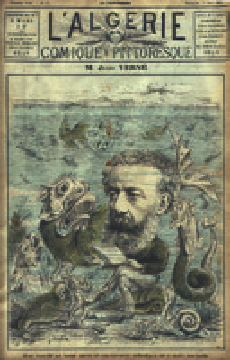Information Technology Reference
In-Depth Information
17
Computers and science fiction - an essay
No one saw these mice coming. No one, that is,
in my field, writing science fictions. Oh, a few
novels were written about those Big Brains, a few
New Yorker cartoons were drawn showing those
immense electric craniums that needed whole
warehouses to THINK in. But no one in all of future
writing foresaw those big brutes dieted down to
fingernail earplug size so you could shove Moby
Dick in one ear and pull Job and Ecclesiastes out the
other.
Ray Bradbury
1
Early visions
The British science fiction writer, Brian Aldiss, traces the origin of science
fiction to Mary Shelley's
Frankenstein
in 1818. In her topic, the unwise scien-
tist, Victor Frankenstein, deliberately makes use of his knowledge of anatomy,
chemistry, electricity, and physiology to create a living creature. An alternative
starting point dates back to the second half of the nineteenth century with the
writing of Jules Verne (
B.17.1
) and Herbert George (H. G.) Wells (
B.17.2
). This
was a very exciting time for science - in 1859 Charles Darwin had published
the
Origin of Species
; in 1864 James Clerk Maxwell had unified the theories of
electricity and magnetism; and in 1869 Mendeleev had brought some order to
chemistry with his
Periodic Table of the Elements
, and Joule and Kelvin were laying
the foundations of thermodynamics. Verne had the idea of combining modern
science with an adventure story to create a new type of fiction. After publishing
his first such story “Five Weeks in a Balloon” in 1863, he wrote:
I have just finished a novel in a new form, a new form - do you understand? If
it succeeds, it will be a gold mine.
2
And a gold mine it turned out to be. In the next decade Verne published his
highly successful series of
Voyages Extraordinaire - Journey to the Center of the Earth
,
From the Earth to the Moon
,
Twenty Thousand Leagues under the Sea
, and
Around the
World in Eighty Days
. Verne's stories were grounded in scientific fact and set in
the present or near future. Wells's approach to his
scientific romances
was in con-
trast to that of Verne. In 1895, Wells's novel,
The Time Machine
, has the scientist-
inventor traveling through time, exploring a rather bleak future for humanity.
B.17.1. Jules Verne (1828-1905)
was one of the founding fathers
of the science fiction genre. This
is the cover page of
L'Algerie
maga-
zine from 15 June 1884, announc-
ing his latest novel.
333

Search WWH ::

Custom Search